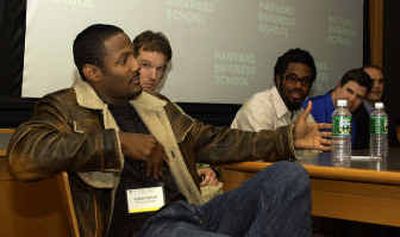Down to business

BOSTON — Kansas City Chiefs fullback Tony Richardson admitted to more than the usual insecurity when he arrived at the Harvard Business School: In addition to the once and future CEOs roaming the halls, two of his classmates had three Super Bowl rings.
“I wasn’t going to say anything about that,” New England Patriots linebacker Ted Johnson said with all the mock modesty of a Harvard student, even one who is spending just two weeks in an executive education course on this brick-and-ivy campus along the Charles River.
Welcome to the nation’s most prestigious business school, an incubator of great financial minds and, this week, 30 NFL players preparing for a world where returns aren’t just measured in yards.
In two weeks of classes, the athletes are studying topics such as “Cash flow vs. Profitability — Sustaining Growth” and “Introduction to Entrepreneurship” while getting a chance to hobnob and network with the elite of the business world.
Harvard Business School has trained many of finance’s biggest stars — including the heads of Procter & Gamble, General Motors and Staples — as well as some who went into politics, like President Bush, Massachusetts Gov. Mitt Romney and New York Mayor Mike Bloomberg. But in addition to its two-year MBA, the school also holds shorter, non-degree programs for those wanting to pick up a few business skills.
“I’ve seen too many guys have a lot of problems when they’re done with their playing careers. The transition to life after is very difficult,” Johnson said. “When I heard it was at Harvard — talk about a soft sell. This is as good as it gets.”
The NFL and the players’ union helped arrange the classes at Harvard and a similar one at the University of Pennsylvania’s Wharton School, which was third behind Harvard in the 2006 U.S. News rankings, much in the same way Philadelphia’s football team lost to New England in the Super Bowl.
For two Eagles players, that made it worth a trip.
“When you say ‘Harvard,’ it holds such prestige,” said receiver Freddie Mitchell, who gave a “shout-out” to his own school, UCLA. “I can go to Wharton any time.”
Actually, although former NHL players Gord Kluzak and Ken Baumgartner got their MBA here, it’s not likely many professional athletes — and certainly not 30 — could attend either school. That would involve a rigorous application process and two years away from NFL weight rooms and paychecks.
The executive education program is just two weeks — shorter than an NFL minicamp but long enough to pick up a few pointers.
The NFL players’ association reimburses athletes for the tuition.
“We value education in the National Football League,” said Mike Haynes, an NFL vice president. “We know how important it is if you really want to be (financially secure) after you hang up your cleats.”
There are no grades, but the players have their own All-Pro team. Retired receiver Damon Dunn established himself as a real estate guru, and several players were impressed by how tenaciously Giants defensive back Jack Brewer challenged his professors during discussions.
Players are taught by regular professors; they use case studies to show what went wrong or right in a certain business, which, when you get down to it, is just like breaking down game tape. More of an adjustment is the way students drive the class discussion.
“In the NFL, it doesn’t work that way,” Johnson said. “Coach (Bill) Belichick doesn’t ask for my opinion.”
The school has had to make some adjustments as well. No one was eating the sweets on the snack tables, so out went the cookies and in came power bars; for drinks, they brought in smoothies and Gatorade.
And the program had to be changed to include a monthlong break in the middle so the players wouldn’t be away from workouts too long.
In general, though, the players found it easy to forget football. With the busy schedule, they pretty much had to.
Classes start at 8 a.m. and tend to run into lunch with students peppering the professors with questions. Afternoon classes lead into a reception and dinner at which the players find themselves talking more about what they studied that day.
At night, there’s homework and discussions among the players that last into the early hours of the morning.
Richardson already has a business degree from Webster University in Kansas City. If nothing else, the classes will help him vet the offers he attracts as a high-profile and well-paid professional athlete.
He has already learned how to pass.
“As football players, we want to be in the game. We don’t want to be on the sideline,” he said. “I’ve just learned that it’s OK to be on the sideline in business.”